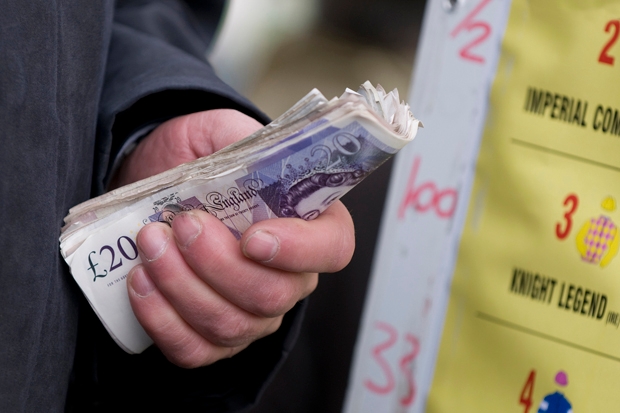Forced to depart Ascot earlier than usual to fulfil a cruise lecture booking on the fjords, I hadn’t reckoned with June in Norway. It turned out to require anoraks and sweaters rather than shorts and suntan oil, although Mrs Oakley and I were better prepared than one lady passenger: having travelled without a scarf, she confessed that it was indeed her deftly folded nightie she had wrapped around her neck for warmth. At least a bit of book-signing went without a hitch, better than the time a young lady asked me to write ‘To Bubbles with love and kisses’ and then, when asked to pay for the signed volume, demurred, saying that she thought the books came free with the talk. One purchaser this time, though, did focus my mind on the question of the moment by asking me to explain how racing is financed — an increasingly sore point.
Back in the 1960s, we could have had a Tote monopoly like that which not only richly finances a lushly produced sport in Hong Kong but pays most of the territory’s social-security bill as well, and which in France ensures that owners achieve a much better return on the resources they inject into the sport. Instead the Conservative government, with Rab Butler as home secretary, legalised betting shops while fulfilling Butler’s stipulation that ‘someone leaving a betting shop should feel like they are leaving a brothel’. With the legislation insisting that there should be ‘no television, radio, music, dancing or refreshments on the premises’, betting shops were miserable places until a relaxation in the law in 1986. Nevertheless, more than 10,000 applications to open one were rapidly filed. Although taking bets had previously been illegal, preference was given to those who could prove that they had been doing so for more than a year, and local licensing committees were generous: one permit was granted to a man with previous convictions for theft, assaulting the police and eight counts of welshing, not to mention selling nylon stockings without clothing coupons. The chairman of the bench said that they didn’t want to take away his living!
Having thus provided the bookmakers with what one of their number admitted was ‘a licence to print money’, Butler also came up with the Betting Levy Act of 1961 to help racing provide adequate facilities, prize money and security. Unlike most non-departmental public bodies, the Horserace Betting Levy Board doesn’t receive any funds from the government or National Lottery. Its statutory duty is to collect money by agreement from the bookmakers and spend it to improve horse-breeding and veterinary science, to support horse-racing and to generate increased betting turnover (thus enhancing the Levy and the funds it has to distribute). The Levy Board’s very existence means that racing is organised not simply to provide an expensive spectator sport: it is organised to promote betting and so increase its Levy income. Racing’s authorities stage the kind of racing the bookmakers need to keep their betting shops full and some of the proceeds flow back into racing, much of it low-grade stuff that spreads prize money too far. Arguments between racing’s authorities and the bookmakers about how much bookmakers should pay into the sport have raged ever since the Act was passed.
Changes since the institution of the Levy have seen a huge increase in online betting on many sports, the introduction of fixed odds betting terminals in betting shops for people to play games such as roulette instead (cutting the funds gambled on racing) and the introduction of betting exchanges that connect gamblers with those of opposing views, enabling them to match their bets. Bettors can thus ‘lay’ a horse to lose, previously a function only the bookmaker could perform, and the exchanges take a guaranteed commission from what the winner collects.
Bookmakers say that less of their profits come from horse-racing and complain that they are having to pay more for picture rights to show horse-racing in their betting shops. They say that the exchanges are receiving preferential treatment and the bookmakers have taken more and more of their online business offshore to avoid taxation and cut Levy payments. But when racing’s authorities tried to scrap the Levy and force bookmakers to pay for basic racing data like racecards instead, the European Court ruled they had no rights to sell.
The government doesn’t like the Levy system, which forces it to become an arbiter between racing and the bookmakers. Racing doesn’t like its unpredictability, and the bookmakers say it isn’t fair. Legislation has even been passed to scrap the Levy, although it has not yet been implemented. The problem is that nobody has yet been able to agree on a better system, even though both racing and the government agree there should be a ‘racing right’ forcing bookmakers to divvy up sufficient finance. Since March the government has been committed to that racing right in principle. But there has been an ominous silence since then on the rate at which the bookies should pay. Any deal, it seems, will still be dependent on EU state aid rules. So long as those apply.






Comments